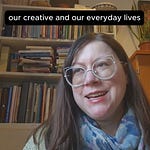Our discussion of poetry up to this point has primarily highlighted the metaphorical and lyrical aspects of this mode of expression.
But there is something else that is essential to poetry… form.
I’ve never read Marshall McLuhan’s book The Medium Is The Message, but that is the idea that applies here. A poem’s shape tells us, in many ways, what it is.
A lot of people can be put off by digging deeply into form. And fair enough - it can seem fiddly, or overly technical, and we can get a bit lost in all the terminology. (Especially when we encounter those rare but inevitable folks who seem to enjoy wielding their own knowledge to make other folks feel stupid.)
Don’t be intimidated!
You do NOT have to be an expert to start engaging with poetic form.
Here’s how to start:
Ignore the rules. But play with the patterns.
Form isn’t a straitjacket - it’s a foundation to build upon. And really, it’s the gift that keeps on giving because when we look at the technical parts of any craft, there are endless possibilities to continue making new discoveries and growing as an artist.
In this video…
This video focuses on how to approach the possibilities of form in a way that feels playful and inspiring.
This touches on:
Clarifying what is meant by ‘the normal rules of language don’t apply’
Form as a way of engaging with tradition
Technique as a tool for revealing intention
Making a bridge between the logical and creative parts of our brains
The excitement of pushing against the boundaries of form
Short poems as the perfect creative laboratory to experiment
What to do if form leaves you feeling stuck (hint: go back to inspiration)
It doesn’t have to be hard
If you’re started playing with form - or even just thinking about playing with form - surprise! You’ve started editing, without even trying!
Technique is essentially a pile of tools that we can use to make our work better - in the sense that it more effectively accomplishes what we intend.
Here’s a lovely article from The Guardian that looks at welcoming ways to think about poetry. It’s a great primer to how to read poetry if you’re new to this - although it’s also a nice refresher for more seasoned readers who’d like to look with fresh eyes.
For now,
Alli
Access Support: If you have access needs that I’m not currently meeting, please do drop me a line! (The best email is contact@ac-smith.com.) I’d really like to make this project available to anyone who wants to participate.










